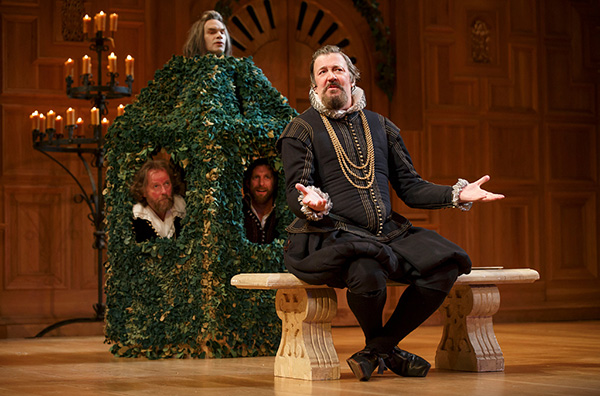Times have changed since Shakespeare’s day when only men performed in theater — women became a regular presence on the London stage in the late 1600s, eliminating the necessity for boys and men to play female parts.
But in the Broadway production of Shakespeare’s “Richard III” and “Twelfth Night” currently running in repertory at the Belasco Theatre, audiences can return to the traditional all-male cast — with unbelievable results.
The cast, transferred straight from London, is headed by Mark Rylance, who theatergoers might know from his Tony-winning outings in “Jerusalem” and “Boeing-Boeing.” He plays Richard in “Richard III” and Olivia in “Twelfth Night,” two roles that could not be more differently written. One is a despicable hunchbacked aspirant to the British throne while the other is a beautiful, grieving young noblewoman.
But Rylance embodies both roles wholly, creating two distinct physicalities — each so precise that they are evoked in every step, every turn of the head and even in the way he holds his hands.
The rest of the cast equally impresses. Samuel Barnett as Queen Elizabeth in “Richard III” matches Rylance blow for blow. He is simply captivating, every inch the mother and wife in mourning he needs to portray. His Viola is only a young woman disguised as a man, as the script dictates.
This all happens despite cast costume changes with the audience watching. The actors spend a good portion of time having their faces powdered and slipping into bustles, skirts and breeches, transforming under the same spotlight.
When Barnett strides to the front of the stage and daintily turns, testing the flow of his voluminous skirts and gliding into character, every trace of the handsome young man disappears.
Candle-filled chandeliers provide light and the costumes are nearly as impressive as the performances. Director Tim Carroll has worked often with Shakespeare’s texts in the past, and that shines through in this production.
He, and everyone else involved, knows the ins and outs of each spoken word. Like every aspect of the production, though, his direction never shows. It feels completely natural, allowing the audience to appreciate Shakespearean theater for precisely what it is — actors on a stage becoming wonderful characters, reciting beautiful words and telling a story.
A version of this article appeared in the Tuesday, Nov. 19 print edition. Dylan Jarrett is books/theater editor. Email her at [email protected].

























































































































































